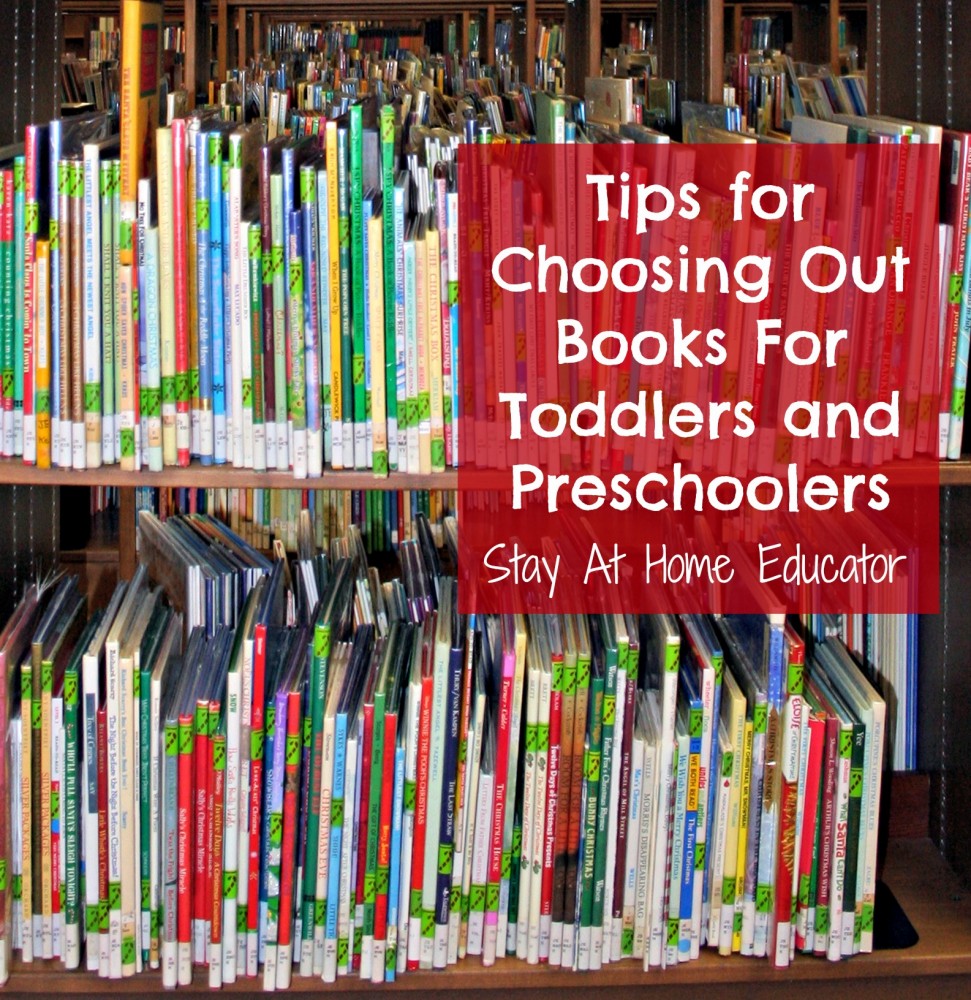Tips for Choosing Out Books for Toddlers and Preschoolers
One day while checking out books at the library, it seemed like every time I took a book out of the bottom basket in the stroller, two more appeared in its place…and before I knew it William, Corinne and I had checked out 38 books (only two less than the limit). This is no exaggeration. The librarian even raised his eyebrows at the pile on his checkout desk. And only three of those books were actually for me, which meant that the other 35 books were some I’d chosen out for the kids, and some the kids just threw into the basket.
Once we got home and began reading, I quickly found that I liked some of those picture books much better than others. One had a great story, but was ruined by what I feel was an inappropriate ending. One was a fun rhyming version of a familiar story, but was ruined by “potty” words. One had way, way too many words to even keep my interest, let alone the interest of a preschooler. One had a font that was so difficult to read that I could hardly make it through the story without giving up, thus ruining the cadence of the rhyme. One had a beautifully written story, but lost my son’s interest due to very abstract pictures. Many had great and elaborate storylines for older children, but not for my young kiddies. After getting through all the books (not all at once), I found that only a handful of books were truly appropriate for William and Corinne.
Since then, I have changed the way I check out books at the library. I am more thoughtful and deliberate about our choices and I’m more picky about what comes home. Here are some things to consider when choosing out books for young children.
Choose books that are at an appropriate level for your child. – Young toddlers enjoy books with lots of rhyme and repetition. They enjoy predictable text and jump at the invitation those books offer for them to join in the reading process. Preschoolers enjoy books with slightly more complex storylines with one to two paragraphs of reading per page. School-aged children love books at their personal reading level.
Books fall under three levels: those that the child can read alone, those that the child can read with an adult, and those that an adult must read to the child. For pre-reading children, flipping through the book and reading pictures falls under the first level, and a preschooler will finish sentences in predictable text in the second level.
Select a variety of books. – While it is common for children to want to read the same book over and over again (something that should be encouraged), they should also be encouraged to read a variety of books. While your child may love stories about fairies, on occasion check out a book about dragons or pirates. At each library visit, help your child choose a few non-fiction books within a topic of interest to them. Many libraries now carry informational books that are written with a preschooler in mind. However children will sit through a very difficult text if their interest in the topic is strong enough.
Choose books that are of an interesting topic to your child. – If your child loves dinosaurs, or princesses, or nature, or cats make an effort to find stories with those kinds of characters, or non-fiction text relating to the topic of interest. Prior to going to the library, ask your child what kind of books he wants to check out, then get online and find books under that category. This is most successful if your local library has an online catalog where you can make a list and print it off before you go.
Ask your child to help you choose books. – Show a book to your child and flip through the first couple of pages, or actually read the first few pages out loud. Many libraries now have a nice seating area next to the children’s section where parents are invited to sit and read with their children. Your child will be more than happy to tell you if he wants to take that book home or not.
Choose books that are award-winning. – Read books that have a Caldecott, Seuss, or other author and illustrator medals. And, did you know that the New York Times has a best sellers list for children’s picture books? Click here for the link. It is a great place to find the most recent popular books for kids.
Choose books from familiar authors. – If your child loves Brown, Brown Bear, What Do You See?, then she will probably enjoy Polar Bear, Polar Bear What Do You Hear?, both by Eric Carle. If your child has a list of favorite books, check out other books by the same author. Your child will enjoy the same lyrical style of writing, or the familiar illustrations.
Choose books that mimic events in your child’s life. – Children love talking about things that are happening in their lives, and they also love reading books they can relate to. For example, if a new sibling is on the way, check out a book or two about welcoming home a baby. If your child is nervous about going to a formal preschool or entering kindergarten, find story books about it. If your child wants to be a police officer, find a book about a day in the life of policeman. Your child will take interest in books that relate to their own personal lives.
Most importantly, take your child to the library or book store frequently. Have available a well rounded supply of books that are always available to your child. Encourage a time during the day that is set aside just for reading. Reading solo and for reading together. Take the above information into consideration and go home and read!
For further reading:
Tips for Choosing Books for Kids by National Education Association How to Choose Books for Kids by Library Journal Take the Mystery Out of Choosing Good Books by rif.org
I’m Sarah, an educator turned stay-at-home-mama of five! I’m the owner and creator of Stay At Home Educator, a website about intentional teaching and purposeful learning in the early childhood years. I’ve taught a range of levels, from preschool to college and a little bit of everything in between. Right now my focus is teaching my children and running a preschool from my home. Credentials include: Bachelors in Art, Masters in Curriculum and Instruction.


It is great that this post underlined that it is important to give children options when giving them activity books. It is interesting to know that by giving options, it will give children the liberty to choose as well as teaching them to develop other senses. My sister is looking for activity books to give her 4-year-old son. I will remind her to consider giving him options.
Thanks for mentioning that it’s good for kids to read a variety of books and that they’ll sit through a very difficult text if their interest is high enough. My sister is thinking of shopping for some fiction book series of Alexander the Great because she speculates that it’ll help broaden her children’s knowledge. I think it’s a good investment to shop from a reputable company that can provide the best pieces of text to help her children with some history.
You’re absolutely right, Jesse. Interest plays a huge role in kids wanting and enjoying reading. We are reading the Hatchet with my preschool sons right now. They love learning about survival.
Parents have a major role to portray in finding the right books that their kids would love to read while they stay at home. This article is a big help to parents in choosing the right books depending on the criteria listed above. Thank you for sharing this with us, You’ve been a great help.
I love picking library books! I’ve done it for my little brothers when I was 14 and they were 4 – 6 years old. I’m so delighted I can continue this tradition now with my son! Little Boy doesn’t pick his own books yet, he plays with the toys while I do. But he clearly has his preferences – a few months ago it were sensory books, now he’s really into books with a lot of real life pictures per page, so he can show and tell.
And the series about the panda Noodles is a big hit (it combines sensory pages with a lovely rhyme and rhythm)
Great tips! We’ve had some books that ended up being a little different than we had planned from the library too. Most recently, we checked out a book on the Women of the Bible. I never peeked inside it until, my preschooler opened it right up to a completely nude picture of Eve (at church, no less!)
Great tips!
Thanks for sharing with my Super Link Party! 🙂
We have started selecting some book online and putting them on hold so they are there when we go to the library.
Thank you for this post! I often get so overwhelmed at the library. There are so many choice and it’s tough going through and picking out good ones with a two year old running around! I’m going to feature this tomorrow on my Weekly Kid’s Co-op post. Come check it out! http://www.dirtandboogers.blogspot.com
Great post. Like you, I’ve discovered that you have to select children’s books. Some of them really are inappropriate despite being in the children’s section. Then there are some fantastic children’s books. Thanks for sharing.
Great tips for choosing books for toddlers and preschoolers! I especially liked the one about allowing the child to help choose the book. I think it is important for children to be able to help make choices.